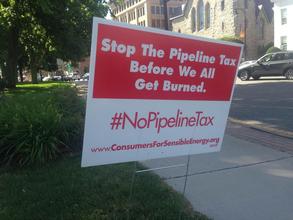Join our e-list for updates and action alerts: click here
 Photo courtesy of: Consumers for Sensible Energy
Photo courtesy of: Consumers for Sensible Energy
Out of Control Utility Power - The Pipeline Tax. CCAG and allies are demanding Eversource drop a requested 16 percent rate increase for natural gas, noting the electric company is already reaping profits from new federal tax breaks and doesn’t need a costly price hike.
In May, Eversource filed a letter of intent with PURA to seek a nearly 16 percent rate increase over three years for its natural gas customers. The utility expects to file a rate increase application this summer requesting increases that would bring in $86 million more over three years, starting in January 2019. Eversource says “The rate increase would allow for continued upgrades in the natural gas system to make it “safer and more reliable.”
If Eversource does not back down on the gas rate increase request, CCAG members and allies will take our opposition to PURA (Public Utilities Regulatory Authority) when the public hearings are scheduled this summer.
RELATED NEWS AND ARTICLES:
WNPR- Hidden Energy Tax' Set To Go Into Effect Next Week. By Patrick Skahill June 19, 2018
CTN- Congressional News Briefing with U.S. Senator Blumenthal, CCAG E.D. Tom Swan and Allies Concerning Natural Gas Prices in Connecticut. Recorded On: 5/21/2018
CT Post- Eversource asked to drop 16 percent gas rate hike by Bill Cummings Updated May 21st 1018
Stamford Advocate- Tom Swan op-ed: Utility’s rate hike merits scrutiny Published Wednesday, January 31, 2018
In May, Eversource filed a letter of intent with PURA to seek a nearly 16 percent rate increase over three years for its natural gas customers. The utility expects to file a rate increase application this summer requesting increases that would bring in $86 million more over three years, starting in January 2019. Eversource says “The rate increase would allow for continued upgrades in the natural gas system to make it “safer and more reliable.”
- Connecticut consumers who already pay more than 20% higher than the national average cannot afford to spend $49 million more for natural gas next year – on top of any additional increases in overall rates which may occur.
- Eversource has already had millions in annual tax breaks handed to them in the form of a massive tax cut recently approved by Congress which more than offsets the requested need for another rate increase to improve gas lines.
- Any ratepayer funds used for safety related infrastructure improvements should be allocated from a separate account that allows PURA to closely monitor such expenditures to ensure all funds are appropriately spent, not handed over to Eversource.
If Eversource does not back down on the gas rate increase request, CCAG members and allies will take our opposition to PURA (Public Utilities Regulatory Authority) when the public hearings are scheduled this summer.
RELATED NEWS AND ARTICLES:
WNPR- Hidden Energy Tax' Set To Go Into Effect Next Week. By Patrick Skahill June 19, 2018
CTN- Congressional News Briefing with U.S. Senator Blumenthal, CCAG E.D. Tom Swan and Allies Concerning Natural Gas Prices in Connecticut. Recorded On: 5/21/2018
CT Post- Eversource asked to drop 16 percent gas rate hike by Bill Cummings Updated May 21st 1018
Stamford Advocate- Tom Swan op-ed: Utility’s rate hike merits scrutiny Published Wednesday, January 31, 2018

Senate Bill 9 Titled “CT’s Energy Future,” passed but CCAG Opposed. Although it did do some good things, we could not fully support this bill because it placed caps on some commercial solar and failed to include net metering. Net metering allows consumers/producers who generate energy through renewables in order to sell excess energy into the grid for universal access. This is essential in order to encourage consumer investment into Class I renewables, without which humankind faces a very limited future indeed.
While the bill expanded the state’s Renewable Portfolio Standard to a 40 percent mandate by 2030, set of numerical goals for Class 1 renewables, and expanded offshore wind options, it also included counterproductive provisions that would significantly harm the state’s rooftop solar market, and represents a major win for the Koch Brothers and big utilities. While there were some other positive aspects such as an extension of incentives that help struggling home-grown solar businesses and continued growth of Shared Solar, they do not make up for gutting net metering on solar energy and placing limits on some commercial solar.
RELATED NEWS AND ARTICLES:
CT Post: Malloy signs clean energy and climate bills. By Bill Cummings June 20, 2018
PV Magazine USA.com: Details of the changes in Connecticut: An interview with Vote SolarIn this interview pv magazine speaks with Vote Solar Northeast Regional Director Sean Garren about the new legislation which has passed both houses of the Connecticut legislature, and what to expect now. May 11, 2018 Christian Roselund
CT Mirror: Energy bill still embroiled in controversy but probably heading to the floor. By Jan Spiegel | May 4, 20

The Attack on Development of Solar. Senate Bill 9 was a major win for large utility companies. The new law will significantly weaken Connecticut’s solar industry and make it virtually impossible to meet the otherwise good increase in renewable goals in the bill.
This is a big blow to residential solar installers in the state. The playbook from Eversource here is the same you’ll see from other utilities across the country: push for a big boost in the Renewable Portfolio Standards to tout a move to renewable energy while limiting the incentives for homeowners to add PV to their homes, thus keeping the added renewable capacity under their control (and bottom line).
In place of net-metering, consumers would have a choice. One choice would be rates – known as tariffs – and formulas for applying them that would be determined by the Public Utilities Regulatory Authority (PURA). Those unknown factors might be disruptive, if not downright stagnating for the solar industry in the state.
Solar owners could also choose what’s known as a “buy-all/sell-all” system, in which a solar owner would have to sell all of his or her power to the grid at a to-be-determined rate set by PURA, and buy back what he or she needs at the retail rate. It would increase certain fees for solar owners and make it difficult, if not impossible, to install battery storage or home-based smart energy systems to help reduce demand.
These issues, as well as caps on certain commercial deployments, are key reasons for concern and the need to closely monitor future development. Moving forward, we will continue to work with legislative and regulatory leaders to preserve consumer choice, the right to self-generation, Connecticut’s 2,200 local solar jobs, and to restore net metering in the next legislative session.
Related Articles and News:
CT Post: Malloy signs clean energy and climate bills. By Bill Cummings June 20, 2018
States like Nevada that hastily ended net metering lost thousands of solar jobs and have since reinstated productive policy for distributed generation.
This is a big blow to residential solar installers in the state. The playbook from Eversource here is the same you’ll see from other utilities across the country: push for a big boost in the Renewable Portfolio Standards to tout a move to renewable energy while limiting the incentives for homeowners to add PV to their homes, thus keeping the added renewable capacity under their control (and bottom line).
In place of net-metering, consumers would have a choice. One choice would be rates – known as tariffs – and formulas for applying them that would be determined by the Public Utilities Regulatory Authority (PURA). Those unknown factors might be disruptive, if not downright stagnating for the solar industry in the state.
Solar owners could also choose what’s known as a “buy-all/sell-all” system, in which a solar owner would have to sell all of his or her power to the grid at a to-be-determined rate set by PURA, and buy back what he or she needs at the retail rate. It would increase certain fees for solar owners and make it difficult, if not impossible, to install battery storage or home-based smart energy systems to help reduce demand.
These issues, as well as caps on certain commercial deployments, are key reasons for concern and the need to closely monitor future development. Moving forward, we will continue to work with legislative and regulatory leaders to preserve consumer choice, the right to self-generation, Connecticut’s 2,200 local solar jobs, and to restore net metering in the next legislative session.
Related Articles and News:
CT Post: Malloy signs clean energy and climate bills. By Bill Cummings June 20, 2018
States like Nevada that hastily ended net metering lost thousands of solar jobs and have since reinstated productive policy for distributed generation.


